
Ferdinand Emmanuel Edralin Marcos Sr. was a Filipino politician and kleptocrat who served as the 10th President of the Philippines from 1965 to 1986. Espousing an ideology of "constitutional authoritarianism" under the New Society Movement, he ruled as a dictator under martial law from 1972 until 1981, and kept most of his martial law powers until he was deposed in 1986. One of the most controversial leaders of the 20th century, Marcos' rule was infamous for its corruption, extravagance, and brutality.

Benigno Simeon "Ninoy" Aquino Jr., was a Filipino politician who served as a Senator of the Philippines (1967–1972) and governor of the province of Tarlac. He was the husband of Corazon Aquino—who, after his death, eventually became President of the Philippines—and father of a later President, Benigno Aquino III. Aquino, together with Gerardo Roxas and Jovito Salonga, helped form the leadership of the opposition towards then President Ferdinand Marcos. He was the aggressive leader who together with the intellectual leader Sen. Jose W. Diokno led the overall opposition. Shortly after the imposition of martial law, Aquino was arrested in 1972 along with others associated with the New People's Army's armed insurgency and incarcerated for seven years. He founded his own party, Lakas ng Bayan and ran in the 1978 Philippine parliamentary election, but all the party's candidates lost in the election. In 1980, he was permitted by Marcos to travel to the United States for medical treatment following a heart attack. During the early 1980s he became one of the most notable critics of the Marcos regime, and enjoyed popularity across the US due to the numerous rallies he attended at the time. As the situation in the Philippines worsened, Aquino decided to return to face Marcos and restore democracy in the country, despite numerous threats against it. He was assassinated at the Manila International Airport on August 21, 1983, upon returning from his self-imposed exile. His death revitalized opposition to Marcos; it also catapulted his widow, Corazon, into the political limelight and prompted her to successfully run for a six-year term as president as a member of the United Nationalist Democratic Organization (UNIDO) party in the 1986 snap election.

The People Power Revolution, also known as the EDSA Revolution, was a series of popular demonstrations in the Philippines, mostly in Metro Manila, from February 22–25, 1986. There was a sustained campaign of civil resistance against regime violence and electoral fraud. The nonviolent revolution led to the departure of Ferdinand Marcos, the end of his 20-year presidential term and the restoration of democracy in the Philippines.

Juan Furagganan Ponce Enrile Sr., abbreviated JPE, is a Filipino politician and lawyer. He was a protégé of President Ferdinand Marcos, and served as Justice Secretary and Defense Minister under the Marcos regime. He later became one of the leaders of the 1986 People Power Revolution that drove Marcos from power and into exile. Enrile has continued to be a prominent politician since then; he was Senate President from November 2008 until his resignation on June 5, 2013.

This article covers the history of the Philippines following the 1986 People Power Revolution known as the Fifth Republic of the Philippines.
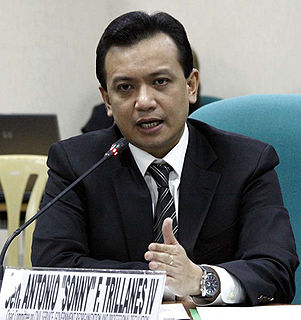
Antonio Fuentes Trillanes IV is a retired Navy officer who served as a Senator of the Philippines. He was a vice presidential candidate in the 2016 Philippine presidential elections.
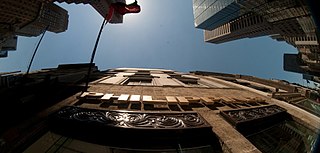
The Philippine Center is an agency of the Philippine Government in New York City and San Francisco in the United States. The New York City structure houses the offices of the Philippine Mission to the United Nations, the Philippine Consulate General, the Philippine Department of Trade and Industry, and the Philippine Department of Tourism. The Philippine Center Management (PCMB) manages the building and its properties. It is committed to "nurture, promote, and propagate Philippine culture, encourage foreign tourists to visit the Philippines, expand foreign markets of Philippine products, and enhance the image of the Philippines."
The Los Angeles Consular Corps(LACC) is an informal organization made up of the international consulates located in Los Angeles, California.

The Philippine presidential and vice presidential elections of 2016 were held on Monday, May 9, 2016, as part of the 2016 general election. This was the 16th presidential election in the Philippines since 1935 and the sixth sextennial presidential election since 1986.

Palau–Philippines relations refers to the bilateral relations between Palau and the Philippines.

The protests against Rodrigo Duterte, the 16th President of the Philippines, began on November 18, 2016 following the burial of the late president and dictator Ferdinand Marcos, who Duterte supported. These series of protests, mostly simple and peaceful, are mostly conducted by left-wing groups and other opposing figures mainly due to the ongoing war on drugs, the declaration of martial law in Mindanao, and employment issues such as contractual terms being applied by companies and inflation which occurred due to the passage of the Tax Reform for Acceleration and Inclusion Act. Other causes of the protests include the government's response to the COVID-19 pandemic in the country, the passage of the Anti-Terrorism Act of 2020, and the shutdown and franchise denial of ABS-CBN.

The following is a timeline of protests against Philippine President Rodrigo Duterte and his policies.

The Philippine Consulate General in San Francisco is a diplomatic mission of the Republic of the Philippines in the United States, representing the country's interests in northern California. It is located in the San Francisco building of the Philippine Center at 447 Sutter Street in central San Francisco, a couple of blocks north of Union Square.

The Embassy of the Philippines in Stockholm is the diplomatic mission of the Republic of the Philippines to the Kingdom of Sweden. It is located on the fourth floor of 29 Olof Palme Street in the central Stockholm district of Norrmalm, across from Norra Bantorget. Although the current embassy dates from 2020, the Philippines also maintained a previous resident embassy in Sweden between 1978 and 2012.
The Philippine Consulate General in Houston is a diplomatic mission of the Republic of the Philippines in the United States, representing the country's interests in Texas. It is located at 9990 Richmond Avenue in the Westchase neighborhood of west Houston.

The Embassy of the Philippines in Kuala Lumpur is the diplomatic mission of the Republic of the Philippines to Malaysia. It is at 1 Jalan Changkat Kia Peng in central Kuala Lumpur, near significant city landmarks like the Kuala Lumpur City Centre and Bukit Bintang.
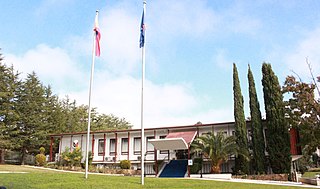
The Embassy of the Philippines in Canberra is the diplomatic mission of the Republic of the Philippines to the Commonwealth of Australia. It is currently located at 1 Moonah Place in the Yarralumla suburb of south Canberra, just beyond the periphery of Parliament House.
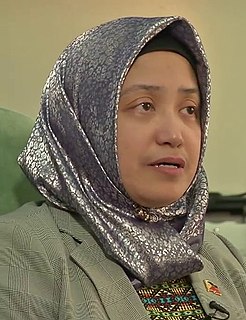
Imelda Macapundag Panolong is a Filipina career diplomat who is the current Ambassador of the Philippines to Oman. She is the first Muslim woman in the Philippine diplomatic corps to be promoted to the rank of Career Minister and later, Chief of Mission, Class II and also the first female Muslim ambassador of the Philippines. Before becoming ambassador, she served as the consul general of the Philippine Consulate in Jeddah, Saudi Arabia and has completed tours of duty in Pakistan, Bahrain, Canada, Indonesia and the United States.
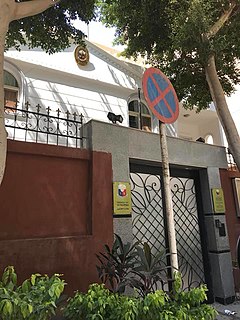
The Embassy of the Philippines in Cairo is the diplomatic mission of the Republic of the Philippines to the Arab Republic of Egypt. Opened in 1960, it is currently located in the southern Maadi district of Cairo, near the Cairo American College.


















